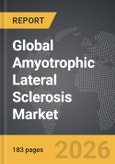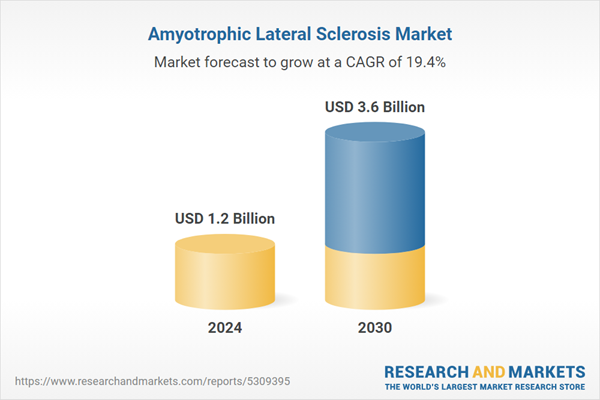Global Amyotrophic Lateral Sclerosis Market - Key Trends and Drivers Summarized
What is Amyotrophic Lateral Sclerosis (ALS) and How Does It Impact the Body?
Amyotrophic Lateral Sclerosis (ALS), also known as Lou Gehrig's disease, is a progressive neurodegenerative disorder that affects nerve cells in the brain and spinal cord. This condition leads to the gradual degeneration and death of motor neurons, which are essential for controlling voluntary muscles. As these neurons deteriorate, patients experience muscle weakness, twitching, and eventually, the loss of the ability to initiate and control muscle movement. This leads to severe physical impairments, including difficulties in speaking, swallowing, and breathing. Despite the varying progression rates among individuals, ALS invariably leads to paralysis and is ultimately fatal, with the majority of patients succumbing to respiratory failure within three to five years from the onset of symptoms. Understanding the nature of ALS is crucial for developing effective treatments and providing comprehensive care for those affected.How Are Research and Treatments Evolving for ALS?
Research into ALS is rapidly advancing, with numerous studies focusing on understanding its underlying mechanisms and developing potential treatments. Genetic research has identified several gene mutations associated with familial ALS, providing insights into its hereditary forms and opening avenues for targeted therapies. The development of biomarkers is another critical area, aiming to improve diagnosis, monitor disease progression, and evaluate treatment efficacy. Currently, only a few medications, such as Riluzole and Edaravone, are approved for ALS, offering modest benefits in slowing disease progression. However, ongoing clinical trials are exploring various approaches, including gene therapy, stem cell therapy, and the use of neuroprotective agents. Advances in technology are also facilitating innovative treatment modalities, such as brain-computer interfaces that help ALS patients communicate and control devices using their brain signals. These evolving research and treatment strategies are essential for improving the quality of life and prognosis for ALS patients.What Challenges and Opportunities Exist in Managing ALS?
Managing ALS presents significant challenges, given the rapid progression and severe impact of the disease. Multidisciplinary care, involving neurologists, physical therapists, speech therapists, and other healthcare professionals, is vital for addressing the complex needs of ALS patients. Access to specialized care centers and support services can enhance disease management, but geographical and financial barriers often limit this access. Additionally, the emotional and psychological burden on patients and caregivers is substantial, necessitating comprehensive support systems. Despite these challenges, there are opportunities for improving care through technological innovations, such as telemedicine and assistive devices, which can provide remote support and enhance patient independence. Advocacy and awareness initiatives are also crucial for securing funding for research and improving public understanding of ALS, ultimately contributing to better patient outcomes and support networks.What is Driving Market Growth for ALS Treatments?
The growth in the Amyotrophic Lateral Sclerosis (ALS) market is driven by several factors, including advancements in medical research, increasing awareness of the disease, and the development of innovative treatment approaches. Technological advancements, such as the identification of genetic markers and the use of advanced imaging techniques, are enhancing the understanding and diagnosis of ALS. The rise in funding for ALS research from both governmental and non-governmental organizations is spurring the development of new therapies and clinical trials. The growing demand for effective treatments is also driven by an aging population, as the incidence of ALS increases with age. Additionally, the expansion of patient advocacy groups and awareness campaigns is leading to earlier diagnosis and better access to care, further propelling market growth. Pharmaceutical companies are increasingly investing in the development of novel therapies, including gene therapies and neuroprotective agents, which hold promise for altering the course of the disease. These factors collectively are sustaining the momentum in the ALS treatment market, offering hope for improved management and potential cures in the future.Report Scope
The report analyzes the Amyotrophic Lateral Sclerosis market, presented in terms of market value (USD). The analysis covers the key segments and geographic regions outlined below.- Segments: Segment (Amyotrophic Lateral Sclerosis).
- Geographic Regions/Countries: World; United States; Canada; Japan; China; Europe (France; Germany; Italy; United Kingdom; and Rest of Europe); Asia-Pacific; Rest of World.
Regional Analysis
Gain insights into the U.S. market, valued at $345.9 Million in 2024, and China, forecasted to grow at an impressive 18.4% CAGR to reach $534.5 Million by 2030. Discover growth trends in other key regions, including Japan, Canada, Germany, and the Asia-Pacific.Why You Should Buy This Report:
- Detailed Market Analysis: Access a thorough analysis of the Global Amyotrophic Lateral Sclerosis Market, covering all major geographic regions and market segments.
- Competitive Insights: Get an overview of the competitive landscape, including the market presence of major players across different geographies.
- Future Trends and Drivers: Understand the key trends and drivers shaping the future of the Global Amyotrophic Lateral Sclerosis Market.
- Actionable Insights: Benefit from actionable insights that can help you identify new revenue opportunities and make strategic business decisions.
Key Questions Answered:
- How is the Global Amyotrophic Lateral Sclerosis Market expected to evolve by 2030?
- What are the main drivers and restraints affecting the market?
- Which market segments will grow the most over the forecast period?
- How will market shares for different regions and segments change by 2030?
- Who are the leading players in the market, and what are their prospects?
Report Features:
- Comprehensive Market Data: Independent analysis of annual sales and market forecasts in US$ Million from 2024 to 2030.
- In-Depth Regional Analysis: Detailed insights into key markets, including the U.S., China, Japan, Canada, Europe, Asia-Pacific, Latin America, Middle East, and Africa.
- Company Profiles: Coverage of players such as AB Science SA, Apotex, Inc., Aquestive, Biogen, Inc., Brainstorm Cell Therapeutics Inc. and more.
- Complimentary Updates: Receive free report updates for one year to keep you informed of the latest market developments.
Some of the 23 companies featured in this Amyotrophic Lateral Sclerosis market report include:
- AB Science SA
- Apotex, Inc.
- Aquestive
- Biogen, Inc.
- Brainstorm Cell Therapeutics Inc.
- Cytokinetics, Inc.
- F. Hoffmann-La Roche AG
- Genervon Biopharmaceuticals LLC
- Ionis Pharmaceuticals, Inc.
- Kringle Pharma Inc.
- Mitsubishi Tanabe Pharma Corporation
- Neuralstem, Inc.
- Orion Corporation
- Orphazyme A/S
- Sanofi SA
- Treeway BV
- Valeant Pharmaceuticals International, Inc.
- ViroMed Co., Ltd.
This edition integrates the latest global trade and economic shifts into comprehensive market analysis. Key updates include:
- Tariff and Trade Impact: Insights into global tariff negotiations across 180+ countries, with analysis of supply chain turbulence, sourcing disruptions, and geographic realignment. Special focus on 2025 as a pivotal year for trade tensions, including updated perspectives on the Trump-era tariffs.
- Adjusted Forecasts and Analytics: Revised global and regional market forecasts through 2030, incorporating tariff effects, economic uncertainty, and structural changes in globalization. Includes historical analysis from 2015 to 2023.
- Strategic Market Dynamics: Evaluation of revised market prospects, regional outlooks, and key economic indicators such as population and urbanization trends.
- Innovation & Technology Trends: Latest developments in product and process innovation, emerging technologies, and key industry drivers shaping the competitive landscape.
- Competitive Intelligence: Updated global market share estimates for 2025, competitive positioning of major players (Strong/Active/Niche/Trivial), and refined focus on leading global brands and core players.
- Expert Insight & Commentary: Strategic analysis from economists, trade experts, and domain specialists to contextualize market shifts and identify emerging opportunities.
Table of Contents
Companies Mentioned (Partial List)
A selection of companies mentioned in this report includes, but is not limited to:
- AB Science SA
- Apotex, Inc.
- Aquestive
- Biogen, Inc.
- Brainstorm Cell Therapeutics Inc.
- Cytokinetics, Inc.
- F. Hoffmann-La Roche AG
- Genervon Biopharmaceuticals LLC
- Ionis Pharmaceuticals, Inc.
- Kringle Pharma Inc.
- Mitsubishi Tanabe Pharma Corporation
- Neuralstem, Inc.
- Orion Corporation
- Orphazyme A/S
- Sanofi SA
- Treeway BV
- Valeant Pharmaceuticals International, Inc.
- ViroMed Co., Ltd.
Table Information
| Report Attribute | Details |
|---|---|
| No. of Pages | 183 |
| Published | February 2026 |
| Forecast Period | 2024 - 2030 |
| Estimated Market Value ( USD | $ 1.2 Billion |
| Forecasted Market Value ( USD | $ 3.6 Billion |
| Compound Annual Growth Rate | 19.4% |
| Regions Covered | Global |









